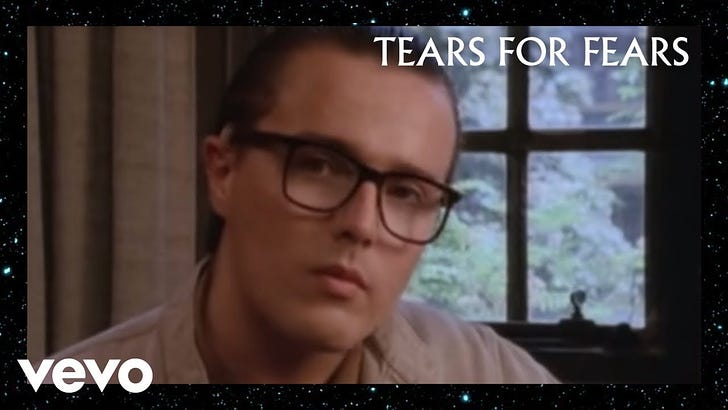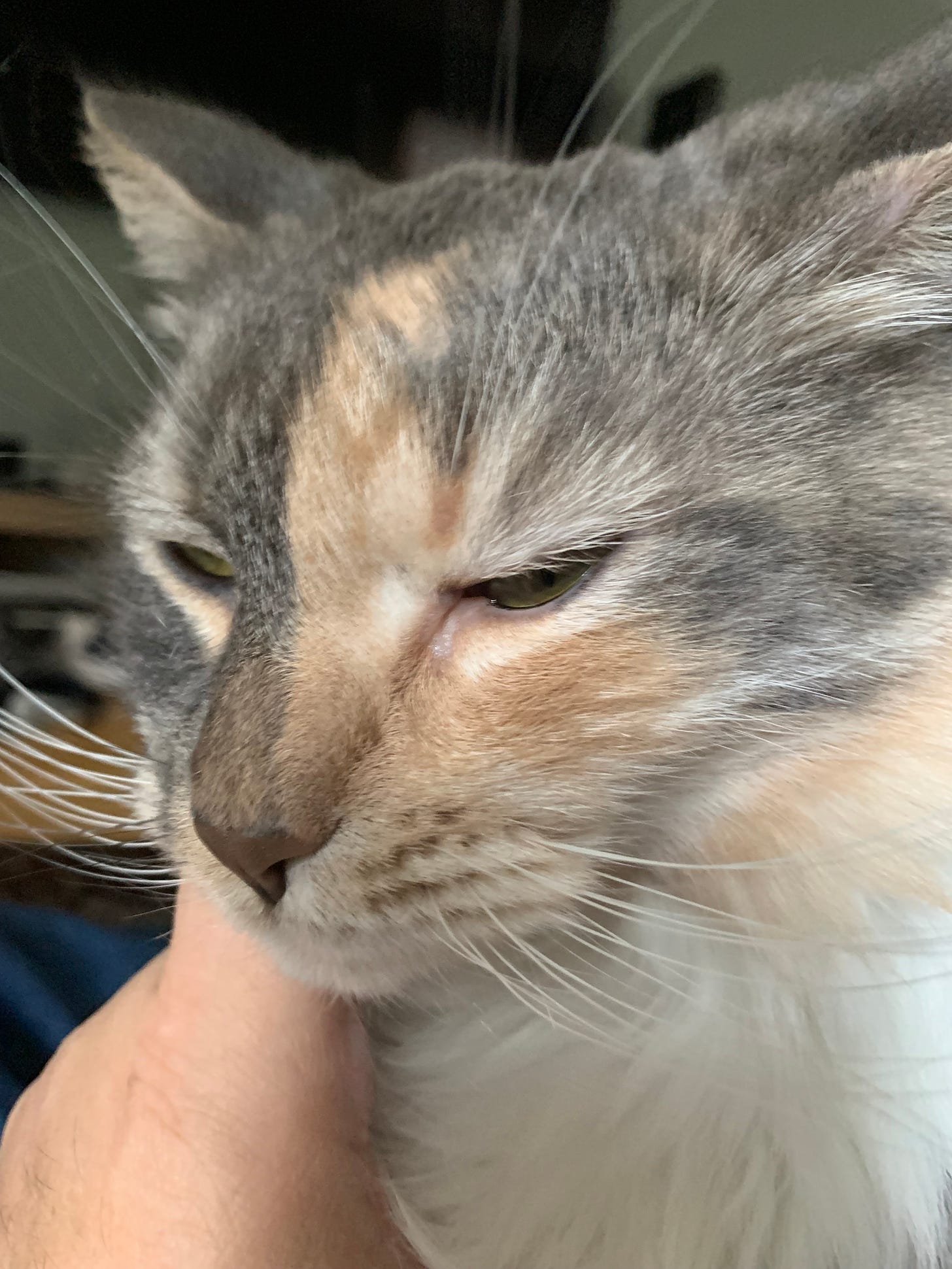The Regular Friday Post
Rando lyrics: Day and night Earth and sky Somehow I just don't believe it
Last week’s rando lyrics: The lyric, “No, no, no, have you no ambition?” is from the song “Head Over Heels” by Tears For Fears from the album Songs from the Big Chair (1985). It appears on several recordings in differing formats - see below:
“An edited version of "Head over Heels" is featured in the 2001 film Donnie Darko.[7] “According to director Richard Kelly on the DVD commentary, the scene in which the song was used was written and choreographed specifically with the song in mind.” Credit: Wikipedia Link: Head Over Heels
“The shimmering, cascading “Head Over Heels” is a romantic love song that “gets a bit perverse” according to Roland Orzabal, as it tackles on the fears and anxieties involved in a new love affair. It is part of a song suite on the album, sandwiched between the track “Broken” and its reprise, which is at the end of the song.” Credit: Genius Link: Genius "Head Over Heels/Broken"
The release is something of a story in it’s own. From the Wikipedia article:
“The 12" version was titled the "Preacher Mix" and is an extended remix of the entire "Broken/Head Over Heels/Broken" medley. The mix was done by producer Chris Hughes and features an unusual spoken word intro in which Roland Orzabal recites lyrics from the song "I Believe" in the style of a preacher. This mix contains the only released studio recording of the "Broken" reprise (the version on the Songs from the Big Chair album is a live recording). The sung vocals from the album version of "Broken" are completely absent, as is the lead guitar line.
The 7" remix was done by David Bascombe and notably ends in a cold stop after the "time flies" lyric, instead of the segue into the reprise of "Broken" found on the album.
There is also a unique radio-only version that was issued on a double A-side single featuring the regular single mix on the other side. This was issued to radio stations for promotion only and has the catalog number IDEDJ 10. The radio mix is noticeably different from the regular single version in that it omits the flanging effects from the drum fill after the second chorus and the closing "time flies" vocals. Whereas the regular single credits the remix to Dave Bascombe, the radio version simply credits Chris Hughes as producer. This version of the single does not include "When in Love with a Blind Man" and has blue-coloured injection moulded labels.”
Welcome to The Regular Friday post!
A big THANK YOU!! to Brad Kyle at Front Row & Backstage for the shout!!
Other Voices
(ED: A couple of weeks ago I did back to back “Rando Lyrics” of a 45 by the Canadian duo “Ian & Sylvia” - I chose to use it for consecutive weeks because it was somewhat unique in that both A-side and B-side became great cover hits for other artists. Yesterday, Mr. Brad Kyle looked at all the covers that followed the release of “You Were On My Mind”. Thanks for the shout, Brad, and what a great in-depth post!! Definitely a “must read”!!)
Other Voices Too:
Seriously. If you’re not reading Adam Nathan’s Substack….well, you can guess what I think about that….
……..You’re here? Go read Adam Nathan after you read the rest of this post and listen to the Spotify playlist……..
For Today:
So we’ve combined the Thursday and Friday posts into one Friday post. One of the topics that is now part of the one Friday post is something called “production”. What’s that? It helps to think of it as “What now?” Your song is written, maybe you’re accompanying on guitar or other instrument, maybe you’re planning to record with friends or other musicians you know, maybe you’re going with “hired guns”. Then, you plan to release your song, and make ONE BILLION DOLLARS!!! PROFIT!!
Aaaaaaand, back in reality, your song is written…. Maybe you’ve recorded an instrumental track with the timing just right, and vocal track synced to that instrumental track and the timing is (finally) just right - beat one is consistent, your vocals come in on one, or two, sometimes even on 3 or 4 for the hook. However you’ve written it, you’re on the planned beat. Every time. Fabulous!! Now what?
Now is when a producer comes in. First fact: You should get what you pay for when you go with a producer. Meaning if your producer is your friend who “knows some people and stuff” and is doing it for free, things may not go as well as you predicted.
Most important fact: Your producer should be someone “in the biz” who’s “been there”. Maybe where you are now and have successfully come out the other side, maybe someone who isn’t a musician but knows how things work in the the recording/releasing business end of things. Audio engineers often double as producers, for obvious reasons.
So, plan on paying your producer for production - the stuff that happens after the writing, and during the recording, engineering and mastering parts of the process. If you’re with a label, they’ll take care of the release part of things (they’ll definitely be getting their cut for that as well…).
If you’re independent, you’ll be doing many of the things following delivery into your hand of a “master” - the final, high quality recording mastered by a professional audio engineer and ready for streaming services or vinyl/CD pressing. “The things” following delivery you’ll be doing yourself (if you’re not paying a producer for those things) include registering your songs with a publishing administration service and a distribution service. Think CD Baby Pro or Songtrust, or a company like that for publishing admin, CD Baby or Distrokid or similar companies for distribution. Also the Mechanical Licensing Collective (for streaming) and Sound Exchange (for broadcast). Complex and time consuming? Yes, but very doable. On the other hand, if your strengths are primarily songwriting/vocals/instrument/home recording, that’s fine, just plan on paying an audio engineer and producer (who could be the same person) to take care of the rest of the business end of things for you. If you decide to do this yourself - and I highly encourage self-publishing and releasing, at least once so you know what all it entails - it won’t be easy, especially the first time, but it gets easier as you continue on. Check out the videos below from Mr. Tony Van Veen of Disc Makers for some great information:
Mr. Van Veen is an experienced player in this subject matter. If you’re signed to a label or any kind of publishing/sound recording/writing-composing deal, pay close attention to what he’s saying, especially in the third video about publishing splits. Splits are going to involve money. Money is what screws up friendships and relationships and all sorts of interactions. I appreciate his advice to cooperate, get along, keep the end result in mind. Great advice….
But… money can disrupt best laid plans and everything else. I would add to or temper Mr. Van Veen’s advice with: Keep your word. Make every deal clear. Don’t cheat, don’t be greedy - in short, be a professional and expect professional behavior from everyone you deal with.
Some Links for today:
From Acoustic Guitar Magazine:
From Blues Guitar Unleashed:
From the Disc Makers Blog
From Songtown:
From American Songwriter:
Toby Keith Update - You may know Mr. Toby Keith is battling stomach cancer - this is a heartwarming story about his progress.
This Substack is free, I receive no compensation of any kind from companies or products I mention. Some linked or quoted material may be copyrighted by others, and I credit them. I rely on the “Fair Use” doctrine for educational purposes (Link: Fair Use). I do not use AI, things I link to might though. -Michael Acoustic
Thank you, new Subscribers!!!!!! Mika, the Cat, welcomes you!!
This Week’s Conversation With Mika:
Mika: “Yeah, right there. That’s the spot… just under my chin, a little to the right now…”
Me: “I really can’t do this all day…”
Mika: “Shhh…yes you can…”
Shameless Self Promotion Section:
My song is out! Link: “Long Road Back” (click on link for streaming options)
What I’m Listening2:
Cheers and keep playing!!
Michael Acoustic
“It’s never really final - you just run out of things you can bear to change…”









LOL - you should be used to it by now, Adam - You did it! You’re famous!!
Totally unrelated department. I tracked two links down: the first on string widths. Guy is a superb guitar player. I've always thought of string gauge primarily from the trade off between flexibility/effort and rich lows, but it's more than that clearly. I wish he spliced the tape together by piece, featuring each one in turn and then a new piece, but it's great. As an electric guitar player first, I always favor lighter gauges because the bend situation gets so bleak as things thicken up.
More interesting to me was the rhythm guitar/metronome link. I have been doing a LOT of work around time in my playing recently, some of this because of an insane dedication to EarMaster, an application I love for two miniature custom drills it has. One is repeating back random rhythms with different degrees of tolerance from the application for accuracy. The other is playing notated rhythms back. I do the second one on the extremely intolerant setting so that you need to get really, really close. Each note gets marked with a tiny on/ahead/behind the beat indicator. What this mostly reveals is one's pattern. I'm a "rusher." It's great to see the problem notated so clearly, and I enjoy the practice.
This has led to a deep connection to the click track to the point that i'm now ultra aware when I'm EXACTLY on the click. Not generally, but indistinguishably on it. It's very, very hard for me to be "perfect" on that. I suspect it is just plain really hard, something like race car drivers try to get every curve right, but it's an infinite journey. What this has done, though, is make me highly aware when other musicians are drifting now (or when they are beautifully locked into it.) I saw a band the other night that were good, but every time the drummer did an energetic fill he ever so slightly lost the beat. I think the obsessive practicing on the ear training tool has made this easier to feel.
I also am striving to ALWAYS hear the click almost as another instrument. If i'm only playing the second and third eighths of a triplet, I still hear the first eighth as the click so that it all sews together. It's very hard for me to stay locked into that universal beat, but it's exciting to start thinking of music that way. The woman teaching that video's exercises will be useful as I translate some of this iPhone work to the guitar itself.
OK, I need to leave room for other people to get a word in here. 😀